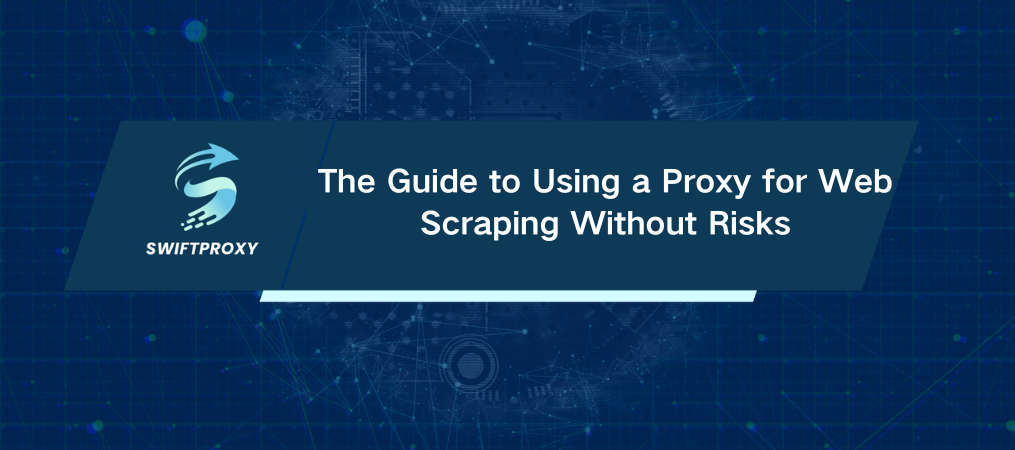The Guide to Using a Proxy for Web Scraping Without Risks

Data scraping—when done right—can be a powerful tool for businesses. But when handled recklessly, it's like playing with fire. Forget proxies, and you might as well be setting your company up for disaster. Here's why unprotected scraping is more than just a mistake—it's a risk that could cripple your operations and tarnish your reputation.
Case 1: E-Commerce Business Hit Hard by IP Ban
An e-commerce giant was blindsided when its price monitoring system went down for 48 hours. Why? An IP ban. In that short window, the company lost millions in potential orders and market share. All because their data scraping wasn't protected with proxies.
The Role of Price Monitoring Systems
In today's hyper-competitive e-commerce landscape, staying on top of competitors' pricing is crucial. A well-oiled price monitoring system gives you real-time insights into market trends, allowing you to adjust your prices and promotional strategies dynamically. Without it? You risk falling behind.
What's at Stake
When businesses collect competitor pricing through scraping, they rely on the data for:
Dynamic Pricing: Offering competitive prices to win customers.
Optimizing Promotions: Adjusting discounts based on competitors' actions.
Inventory Management: Preventing stock-outs or overstocking.
How Scraping Works
The process seems simple—scrapers visit competitors' websites, pull data on pricing, stock levels, and discounts, and then make strategic decisions based on that intel. But there's a catch. Many e-commerce sites have anti-scraping mechanisms in place that trigger bans if they detect unusual activity. Without proxies, it's only a matter of time before you get flagged.
Why Scraping Without Protection Leads to Bans
Here are the most common ways scrapers get caught:
Too Many Requests: Sending too many requests in a short time is a red flag.
Same IP for Multiple Requests: If all requests come from the same IP, it's easy to spot.
Anti-Bot Mechanisms: CAPTCHAs and bot detection systems make automation nearly impossible to bypass without advanced tools.
Geo-Restrictions: Some websites block access based on geographic location.
The Fallout from an IP Ban
The consequences are real. An IP ban can lead to:
Pricing errors: Failing to adjust prices could cost you customers.
Missed market analysis: Incomplete data means poor decisions.
Massive financial losses: During high-traffic periods like Black Friday, this could cost you millions.
Case 2: Web Scraper Hit with CFAA Charges
Imagine facing 10 years in prison for scraping. That's exactly what happened to a web scraper in 2022 under the U.S. Computer Fraud and Abuse Act (CFAA). Here's how it went down:
The Situation
This scraper accessed paid user data on a commercial site that required login credentials. They bypassed CAPTCHA protections using automation tools, all while fully aware that scraping was prohibited. The result? A criminal case under the CFAA.
CFAA in Action
The CFAA, originally created to combat hacking, now applies to unauthorized access to computer systems—including scraping. If you bypass anti-scraping mechanisms, access data that's behind a login wall, or violate a website's terms of service (ToS), you could be breaking the law.
Why Web Scraping Needs Proxies
Without proxies, scraping can quickly cross into illegal territory. Proxies mask your real IP address, allowing you to scrape data without triggering anti-bot systems or exposing yourself to legal risks.
Here's why proxies are essential:
Avoid Request Overload: Spread out requests across multiple IPs to avoid bans.
Bypass Geo-Restrictions: Access websites from different regions.
Simulate Different Users: Make your traffic look like it's coming from various sources.
Mask Your Identity: Reduce the chances of getting identified as a bot.
Reducing Risks in Web Scraping
If you're serious about scraping data and want to avoid bans, legal issues, and financial losses, here are actionable steps you can take to minimize the risks.
1. Legal & Compliance Strategies
Follow Terms of Service (ToS): Always check the ToS of the websites you want to scrape. Many sites explicitly prohibit scraping or certain types of data collection. Don't assume that silence means permission.
Respect the Robots.txt File: This file tells you which parts of the website are off-limits for scraping. Make sure to follow these rules to avoid scraping restricted areas.
Use APIs When Possible: If a website offers an API, use it instead of scraping HTML directly. APIs usually have higher request limits, standardized data formats, and lower risks of triggering bans.
Comply with Legal Regulations: Laws like the CFAA, GDPR, and CCPA protect users and their data. Ignoring these laws can lead to hefty fines or jail time. Scraping personal data without consent is illegal.
2. Technical Optimization Strategies
Use Rotating Proxies: Proxies change your IP address with every request, helping you avoid detection. With services like Swiftproxy, you can scale your scraping without worrying about bans. It's perfect for scraping high-volume sites like Amazon, Facebook, or TikTok.
Control Request Frequency: If your requests are too fast or frequent, it's an immediate giveaway. Introduce random delays between requests to mimic human browsing behavior. A simple Python script can do the job.
Emulate Real User Behavior: Tools like Selenium or Playwright can simulate real user interactions, making your scraping activity harder to detect.
Implement CAPTCHA Solvers: AI-powered CAPTCHA solvers can help you bypass bot verification when scraping becomes challenging.
Conclusion
Using a proxy helps mask your real IP and avoid detection, significantly reducing the risk of getting blocked. To protect your business, always follow legal best practices, such as checking ToS, using APIs, and respecting robots.txt.

















































